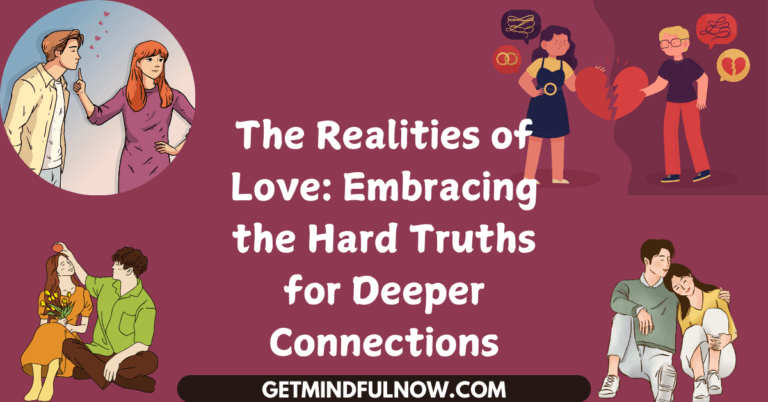Let’s face it: relationships are complicated. They’re not just about love songs and candlelit dinners. They’re a mix of joy, effort, growth, and sometimes pain. Today, I want to share some brutally honest truths about relationships that might just change how you view your own.
Love Is Just the Starting Point
We’ve all heard it: “Love conquers all.” But the truth? Love alone isn’t enough. Think of love as the foundation of a house. It’s critical, sure, but without walls and a roof—like mutual respect, effective communication, and shared goals—that house won’t stand for long.
Take it from Dr. John Gottman’s research on successful couples: those who cultivate rituals of connection and prioritize open dialogue thrive. Love needs consistent effort to be sustained. Imagine a couple who loves each other deeply but constantly argues about money. They attend financial counseling together, learn to budget, and find ways to respect each other’s priorities. That’s how love becomes a livable, thriving partnership.
The End of the Honeymoon Phase Is a Beginning
That initial spark—those butterflies in your stomach? They’re wonderful, but they don’t last forever. And that’s okay. As the honeymoon phase fades, what emerges is a chance to build a deeper, more authentic bond.
This transition isn’t a loss but a gain. It’s where trust, respect, and a sense of partnership come into play. One couple I know started journaling together weekly after their honeymoon phase ended. They reflect on their joys and challenges, using the process to reconnect on a deeper level. The result? A stronger partnership grounded in understanding and shared growth.
Conflict Isn’t the Enemy
Arguments are not the problem; it’s how you handle them that counts. Many people see conflict as a sign of failure, but it’s actually an opportunity for growth. Healthy disagreements can deepen understanding and strengthen your connection.
Here’s a tip: use “I” statements to express your feelings. Instead of saying, “You never listen to me,” try, “I feel unheard when we argue.” It shifts the focus from blame to understanding, creating space for resolution. Consider keeping a conflict journal where you reflect on arguments and how they were resolved. Over time, you’ll see patterns and opportunities to grow.
You’ll Face Incompatibilities—And That’s Normal
You’re an extrovert; they’re an introvert. You love spontaneous adventures; they prefer meticulous planning. Sound familiar? No two people are perfectly aligned, but that doesn’t mean the relationship is doomed.
What matters is how you navigate these differences. Instead of trying to change each other, find ways to coexist and celebrate what makes you unique. One couple I know has a ritual: each week, they plan one activity tailored to each partner’s personality. A lively group outing one day, and a cozy movie night at home the next. It’s about balance.
Routine Can Be Both a Blessing and a Curse
Over time, relationships often settle into routines. While stability is comforting, it can also lead to boredom if left unchecked. The good news? You can use this as a nudge to reignite the spark.
Plan surprise dates, revisit the places you first fell in love, or try something new together—like a cooking class or a weekend getaway. My friend and her partner recently started taking salsa lessons together after years of doing the same dinner-and-a-movie routine. Not only did it bring back excitement, but it also deepened their connection through laughter and learning.
Your Partner Isn’t Your Fixer
It’s tempting to believe that love can heal all wounds, but your partner isn’t there to fix you. They can’t erase your insecurities or fill the voids you’ve carried from the past. That’s your job.
Self-awareness is a game-changer. Consider therapy, journaling, or mindfulness practices to unpack your baggage. When you take responsibility for your own healing, you bring a healthier, more complete version of yourself into the relationship. Reflect on past conflicts and ask: “Was I projecting my insecurities?” This kind of self-work pays off immensely.
Growth Is a Constant
Think about who you were five years ago. Now imagine how much you’ll change in the next five. Relationships evolve because people evolve, and resisting this change can create friction.
Instead, embrace growth as a team. Share your dreams, adapt to new realities, and cheer each other on. Personal development doesn’t have to pull you apart; it can bring you closer together. For instance, attend workshops or read books together on topics that interest both of you. Growth becomes a shared adventure rather than an individual pursuit.
Infidelity Isn’t Always About You
This one’s tough to hear, but it’s true. Cheating is often a reflection of the cheater’s unresolved issues, insecurities, or misguided attempts to fill a void. It’s not always about something you did or didn’t do.
Rebuilding trust after infidelity is challenging but not impossible. Open communication, setting boundaries, and perhaps seeking professional help can pave the way for healing if both partners are committed. I’ve seen couples redefine their relationships by creating new rituals of connection and working on individual growth alongside couple’s therapy.
Effort Is Non-Negotiable
“It shouldn’t be this hard” is one of the biggest myths about relationships. Anything meaningful requires effort. You wouldn’t expect a thriving career or a fit body without work, so why should relationships be any different?
Schedule regular check-ins with your partner. Ask questions like, “How are we doing?” and listen—really listen—to their answers. My cousin and her spouse started doing monthly “state of the union” meetings, and it transformed how they communicate and resolve issues.
Some Relationships Aren’t Meant to Last
Not every relationship is forever, and that’s okay. Some teach you lessons, prepare you for the right person, or help you grow in ways you didn’t expect. Letting go doesn’t mean failure; it means growth.
Take time to reflect on past relationships. What did you learn? How did they shape you? These insights can help you move forward with clarity and confidence. One of my friends keeps a “learning journal” after every breakup, jotting down lessons and realizations. It’s been a source of empowerment.
You’ll Never Stop Learning
Just when you think you’ve got relationships figured out, life throws you a curveball. Every stage of life brings new challenges and lessons, so stay curious and humble. Keep asking questions, keep growing, and keep adapting. Relationships thrive when both partners remain open to evolution.
Final Thoughts
Relationships are messy, beautiful, and profoundly human. They require effort, vulnerability, and a willingness to face uncomfortable truths. But here’s the good news: by embracing these truths, you set yourself up for deeper, more fulfilling connections.
So, what about you? Which of these truths resonates most with your experience? Share your thoughts or your story—I’d love to hear from you.








